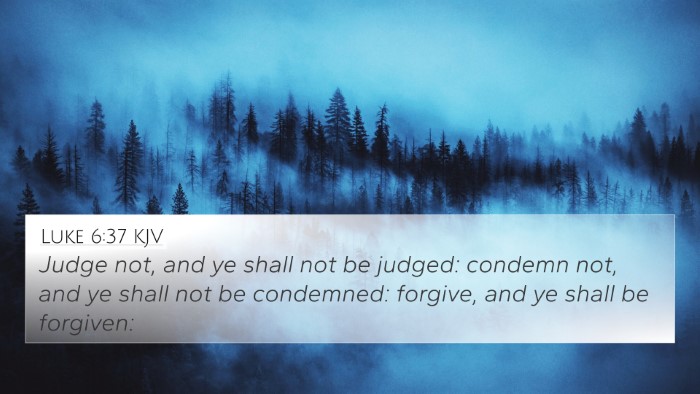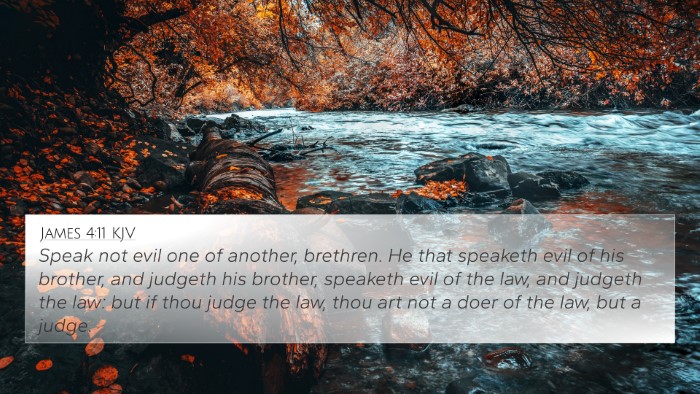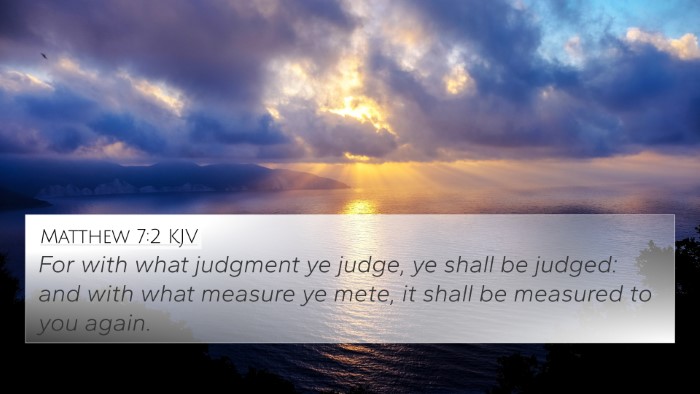This section features a detailed cross-reference designed to enrich your understanding of the Scriptures.
Below, you will find carefully selected verses that echo the themes and teachings related to Matthew 7:1 KJV. Click on any image to explore detailed analyses of related Bible verses and uncover deeper theological insights.
 Luke 6:37 (KJV) »
Luke 6:37 (KJV) »
Judge not, and ye shall not be judged: condemn not, and ye shall not be condemned: forgive, and ye shall be forgiven:
 Romans 2:1 (KJV) »
Romans 2:1 (KJV) »
Therefore thou art inexcusable, O man, whosoever thou art that judgest: for wherein thou judgest another, thou condemnest thyself; for thou that judgest doest the same things.
 James 4:11 (KJV) »
James 4:11 (KJV) »
Speak not evil one of another, brethren. He that speaketh evil of his brother, and judgeth his brother, speaketh evil of the law, and judgeth the law: but if thou judge the law, thou art not a doer of the law, but a judge.
 Romans 14:10 (KJV) »
Romans 14:10 (KJV) »
But why dost thou judge thy brother? or why dost thou set at nought thy brother? for we shall all stand before the judgment seat of Christ.
 Matthew 7:5 (KJV) »
Matthew 7:5 (KJV) »
Thou hypocrite, first cast out the beam out of thine own eye; and then shalt thou see clearly to cast out the mote out of thy brother's eye.
 Luke 6:41 (KJV) »
Luke 6:41 (KJV) »
And why beholdest thou the mote that is in thy brother's eye, but perceivest not the beam that is in thine own eye?
 1 Corinthians 4:3 (KJV) »
1 Corinthians 4:3 (KJV) »
But with me it is a very small thing that I should be judged of you, or of man's judgment: yea, I judge not mine own self.
 Matthew 7:2 (KJV) »
Matthew 7:2 (KJV) »
For with what judgment ye judge, ye shall be judged: and with what measure ye mete, it shall be measured to you again.
 Romans 14:3 (KJV) »
Romans 14:3 (KJV) »
Let not him that eateth despise him that eateth not; and let not him which eateth not judge him that eateth: for God hath received him.
 Ezekiel 16:52 (KJV) »
Ezekiel 16:52 (KJV) »
Thou also, which hast judged thy sisters, bear thine own shame for thy sins that thou hast committed more abominable than they: they are more righteous than thou: yea, be thou confounded also, and bear thy shame, in that thou hast justified thy sisters.
 James 3:1 (KJV) »
James 3:1 (KJV) »
My brethren, be not many masters, knowing that we shall receive the greater condemnation.
 Isaiah 66:5 (KJV) »
Isaiah 66:5 (KJV) »
Hear the word of the LORD, ye that tremble at his word; Your brethren that hated you, that cast you out for my name's sake, said, Let the LORD be glorified: but he shall appear to your joy, and they shall be ashamed.














